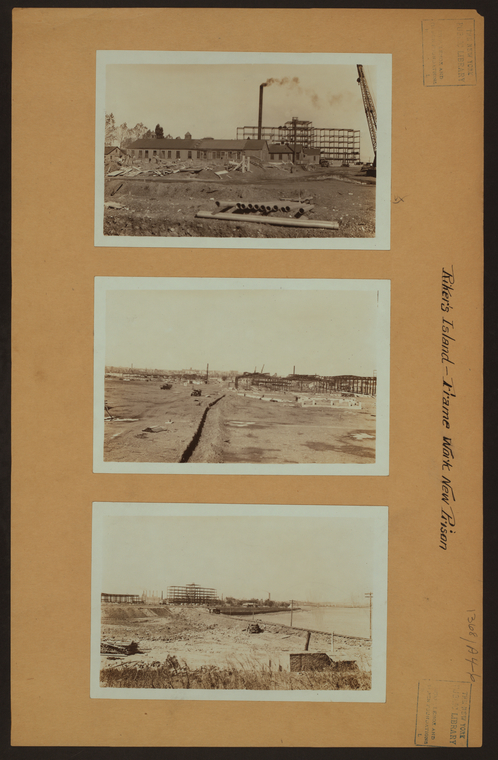Freedom on Rikers Island: Library Brings Books to Patrons
"If you were trapped in an impossible situation, in an unpleasant place, with people who meant you ill, and someone offered you a temporary escape, why wouldn't you take it? …[D]uring your escape, books can…give you knowledge about the world and your predicament, give you weapons, give you armour: real things you can take back into your prison. Skills and knowledge and tools you can use to escape for real."
With a population of nearly 10,000, Rikers Island is the country’s second-largest jail system, with 10 inmate facilities on the premise handled by the New York City Department of Correction (DOC). Once a week, the New York Public Library's Correctional Services, part of the Outreach Services and Adult Programming, provides a circulating book service at five city jails, allowing for over 1200 people to take advantage of library services.
Before I started working at NYPL, I had no idea how intricately the Library is tied to the community. Aside from offering a range of library programs in facilities such as early literacy workshops with detained parents and weekly book clubs with staff and incarcerated patrons, it also provides an annual guide that contains a wealth of resources in New York City to help formerly incarcerated individuals with their re-entry into society.
I was fortunate enough to join Correctional Services on one of its weekly trips. On a gray, sullen-looking day, I set out for Rikers Island. Mostly nervous, and trying to battle various scenes from Orange Is the New Black from seeping into my clouded early-morning thoughts, I watched as the bus slowly crossed the bridge onto a massive concrete unit.
Two rounds of security, another bus ride, one metal detector, and a visitor’s badge later, we made our way to the Library Room. This small room, nudged tightly between the chapel and social services office, contained a wall of donated library books and two carts. These carts had a wealth of various literature, spilling with fiction, nonfiction, Spanish language literature, bestsellers, comics, magazines, and urban literature. As we began our day, wheeling the troves of books toward our designated compound, I immediately noticed the change in prisoners’ expressions as they watched us come by. Most were eager, excited, and desperate to know when we would be reaching their unit.
The first one we visited was a unit of young men ranging in ages from 19–21. The first man I met was exuberant, affable, and kind. I could feel his excitement as he raved about what book he wanted to read next, Joan Rivers's most recent book, and what we should be reading. As each one came to return and collect new books, comics, or magazines, I was delighted and surprised to see how many of the men longed for their weekly library fix. While some went immediately for urban lit, others thumbed painstakingly through magazines and comics, trying to find their favorite series. Many perused bestsellers—James Patterson was a big draw—while others browsed heavier fiction and nonfiction. However, a side conversation I heard during the cart service resonates with me the most: One young man, picking up a copy of Existentialism from Dostoevsky to Sartre, matter-of-factly stated, “I read to expand my mind," in response to his friends, who were messing around with him for looking at philosophy books.
Later that day, we rolled our library to another similar unit. While some breezed through fiction, one patron spent a long time leafing through comics. "Looks like all the good ones were taken this morning," he stated, somewhat despondently. Louise, my mentor for the day who comes to Rikers two to three times per week, shuffled through her bag before giving him a pile of drawings that looked like X-Men characters. "I remembered; I know exactly what you're looking for!" she exclaimed. Slowly, he flipped through the pages. Suddenly, he laughed: "These are great, but my girlfriend won't want me to draw her pictures of monsters!" After some brief banter and reassurances of more drawings to come, he disappeared behind the large metal doors. I later learned that he was an aspiring artist and had been sending drawings to his girlfriend since he'd been incarcerated.
While we wheeled through other locations the rest of the day, I couldn't help but notice how important the Library was for these patrons. Whether it was learning to draw characters from comic books, diving into philosophy, or even establishing a bond with the librarians, they found successful escape in books, and they wanted more. Though their current circumstances aren't ideal, they certainly have freedom in exploring other worlds, whatever those worlds may be.
Visiting Rikers Island was an unforgettable experience—one I cherish not only because of my interactions but also because the Library was able to provide a slice of freedom, of escape: building and feeding an imagination that cannot be imprisoned.
Read E-Books with SimplyE
 With your library card, it's easier than ever to choose from more than 300,000 e-books on SimplyE, The New York Public Library's free e-reader app. Gain access to digital resources for all ages, including e-books, audiobooks, databases, and more.
With your library card, it's easier than ever to choose from more than 300,000 e-books on SimplyE, The New York Public Library's free e-reader app. Gain access to digital resources for all ages, including e-books, audiobooks, databases, and more.
If you don’t have an NYPL library card, New York State residents can apply for a digital card online or through SimplyE (available on the App Store or Google Play).
Need more help? Read our guide to using SimplyE.

Comments
Reading on Rikers: A Democratic Action
Submitted by Lorraine (not verified) on July 21, 2015 - 5:23pm